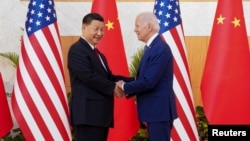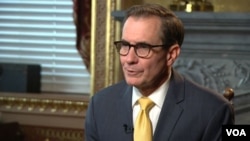Preventing Beijing’s election interference on Taiwan and reestablishing communication between American and Chinese militaries will be high on President Joe Biden’s agenda Wednesday during a highly anticipated meeting with his Chinese counterpart, Xi Jinping, in the San Francisco Bay area.
National Security Council spokesman John Kirby spoke with VOA White House Bureau Chief Patsy Widakuswara ahead of that meeting, and said Biden intends to place the rocky relationship on a "more responsible footing" but believes that he's coming into this meeting from a strong position backed by a solid U.S. economy.
The following interview has been edited for clarity and brevity.
VOA: On to the upcoming meeting with Chinese leader Xi Jinping. A key subject for the president is to warn Beijing against interfering in Taiwan's election. Taiwan says this has already happened through military pressure, through disinformation, manipulating opinion polls. Can Biden convince Xi on this issue, which is clearly very sensitive to the Chinese as well?
JOHN KIRBY, NATIONAL SECURITY COUNCIL COORDINATOR FOR STRATEGIC COMMUNICATIONS: The president’s looking forward to this meeting with President Xi this week. It comes after many, many months of ups and downs in our relationship. He believes that as two leaders running two countries, that literally the bilateral relationship is one of the most consequential in the world, that we've got to get it onto a more responsible footing than it is or has been to date.
And he believes that he's coming into this meeting from a strong position. The United States economy is stronger now than it's been in many, many decades. And we have shored up and revitalized our alliances and partnerships throughout the Asia-Pacific and beyond. And he looks forward to hearing President Xi's perspectives, as well, about how to manage this relationship going forward.
I won't go into more detail in terms of the specifics that they will be going through and certainly not with respect to election interference in Taiwan. I would just say that we -- it is not uncommon for PRC [People’s Republic of China] actors to behave irresponsibly when it comes to election interference in the region and beyond. And we believe that a real strength of democracy is free and fair elections that are unimpeded and uninterrupted and not impaired by foreign interference.
VOA: Another key thing that President Biden wants is reestablishment of military-to-military communications. This is something that Secretary [of State Antony] Blinken was not able to secure. What is the holdup that it needs the president to push for this?
KIRBY: Again, I'm not going to get ahead of the meeting that he's going to have with President Xi. Clearly, one avenue of communication that has not been open has been the military-to-military lane, and that's important because, my goodness, when you look at some of the intercepts that have happened in the Asia-Pacific region, that can get dangerous really, really fast. When you think about the miscalculations that can occur as China presses these, very aggressively presses these maritime claims of theirs that aren't grounded in maritime law, that having an ability for the two militaries to communicate at various levels is a healthy thing to reduce miscalculation and misunderstanding, reduce the possibilities of conflict.
VOA: Ahead of the APEC summit in San Francisco, we are expecting some sort of announcement on the Indo-Pacific Economic Framework, but we are also hearing some protests from Democrats. [Ohio] Senator Sherrod Brown has said that the trade pillar of APEC is unacceptable because it threatens American jobs. Will the administration dilute this pillar based on those concerns?
KIRBY: We're looking forward to a very productive APEC here. Twenty-one countries in the region will be attending, a region that represents 60% of global economic output. And one of the things that the president is going to be pushing for is more inclusive economic growth throughout the region. ... In other words, workers' rights and looking after, you know, the ethical growth of economic output and making sure that we're doing this in a way that is as transparent and as viable as possible.
VOA: Can we speak a little bit about Andriy Yermak, a top aide to Ukrainian President Volodymyr Zelenskyy, meeting with national security adviser Jake Sullivan? Does the Yermak visit influence in any way the messages President Biden is planning to discuss with APEC leaders and President Xi on Ukraine?
KIRBY: I would look at this meeting as a continuation of discussions that Mr. Sullivan has had with Mr. Yermak ... since the beginning of this war, and they are constantly speaking to one another. This is another opportunity now for them to talk about how the United States is going to continue to support Ukraine, how we're going to continue to talk to members of Congress about the importance of supporting Ukraine going forward and the supplemental request that the president submitted for security assistance in particular, and, again, get a sense from Mr. Yermak about what's going on in this counteroffensive, what's going on on the battlefront, what their needs are, and what their, and what they believe their prospects are going forward for these, as the winter months approach.





